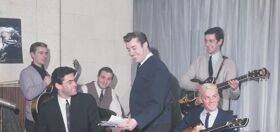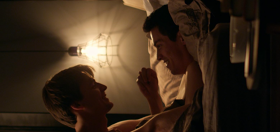
The Vanity Fair editor turned filmmaker Matt Tyrnauer had the distinction of having two films in this year’s Outfest festival, Studio 54, which played at the opening night gala, and Scotty and the Secret History of Hollywood which showed in the Audience Awards competition.
Following his screenings, Tyrnauer invited Queerty to a private celebration in honor former pimp-to-the-stars Scotty Bowers’ 95th birthday, where we enjoyed cocktails and conversation. The following day, Tyrnauer and I sat down for a chat about his two movies: Scotty and the Secret History of Hollywood, opening July 27, and Studio 54, in theatres October 5.
We both sipped coffee on a Sunday morning, taking a reprieve from Outfest.
Thanks for having me to Scotty’s party yesterday. I had a lovely time.
How about we take this to the next level?
Our newsletter is like a refreshing cocktail (or mocktail) of LGBTQ+ entertainment and pop culture, served up with a side of eye-candy.
Yeah, I love these pockets of old-fashioned, genteel gay WeHo.
Yeah, everybody’s kind of nice. You’re ruling Outfest this year. In fact, there’s probably a queen joke in there somewhere, but I’m not going to be the one to make it. I attended both screenings, they were totally, totally packed. What has the response been?
It’s been overwhelming. I never really have been steeped in Outfest before. I’ve been to a couple of events over the years, but I really wasn’t prepared for the attendance at the festival and the scale of it. So to have two packed houses and two films with such enthusiastic audiences has been not only exciting but also an overwhelming experience I wasn’t really mentally prepared for. I didn’t realize Outfest was this massive.
Yeah.
I’ll put it this way: I’m a big believer in theatrical film and theatrical documentaries, so it’s a rare day that a filmmaker gets to see their film with a large crowd cheering during the film. It’s a powerful, heady experience.
Having seen both films now, they’re interesting sort of companion pieces in that they’re both about men—Steve Rubell and Scotty Bowers—who are sexual iconoclasts. That fits in with the subject of Rudolph Valentino as well—he was the subject of your first film.
I think I’m very interested in unconventional families and unconventional relationships. I think the story of LGBTQ people over history has been one of that. Gay people, for many reasons, until the past roughly decade or so when gay marriage and parenting became far more commonplace and accepted, kind of had to make their own families and make them in ways that aren’t officially sanctioned, church endorsed or religion endorsed, or heterosexual family structures.
And so there’s something that’s always been attractive to me about untraditional families, families that are made up of friends and unconventional marriages. And this was really the story of LGBTQ people for so many centuries. And I think it’s a great way to go through life. In my upbringing, I was raised in a conventional family, but I have always thought that these more interesting, less conventional relationships seemed more fun, more potentially fulfilling, more interesting. So if you want to compare all three of those films, I do think that they have a love story at the center of them: Steve and Ian [Schrager, co-owner of Studio 54], Scotty and Lois, Valentino and Giancarlo. But they’re not conventional.
No, they’re not. You could say of all three figures that they’re kind of sexual revolutionaries. It’s not so much about the sexual revolution itself, it’s about the idea of sex as a revolution. That’s certainly true of both Steve and Scotty. Do you see sex as an act of rebellion today?
I learned from Gore Vidal, my mentor, that sex is politics.

Yes.
So I think that holds true. There have been great changes and strides in the same-sex category. There is a lot more openness and acceptance and freedom and equality and everything good that comes with that. However, the story’s not over, and there’s still a lot of oppression and repression all over the place. Less in big cities, but it’s still everywhere. But if you want to take Scotty Bowers as an example, being sexual outlaw which is what he was for most of his life, because what he did was prescribed by society and was literally illegal on many fronts: the prostitution front, the homosexuality front.
And within those illegalities, there were multiple other crimes, because the vice squad was running rough shot over gay and lesbian people in Los Angeles at the time. So if you take a sexual outlaw like Scotty, you have a fascinating portrait of the way things used to be by necessity in a particular place and particular time that I think is a very important history lesson for everyone. There is so much freedom to be who you are now in a city like LA. Hollywood has made strides as well. Scotty I think, was—not intentionally, because I don’t think he sees himself as a political person—I think he was just by being who he was a really important figure in sexual politics. He was short-circuiting a system that was designed to persecute people who had alternative lifestyles…
Sure.
Namely the people in the Hollywood community whose contracts included morals clauses which prevented them from being publicly gay or lesbian. And in that time, especially if you were a high profile person in the movie industry, you would be fired if it was publicly known you were gay. So what Scotty was doing was creating a safe harbor for a lot of gay and lesbian people who wanted to live authentic lives, but also keep going with their careers. There wasn’t much of an alternative.
I think the story of the vice squad in Los Angeles that he unpacks for the viewer in the film is stunning to this day. I think it’s even more stunning that people don’t know this information: the Los Angeles police department operated an extortion ring to persecute gay and lesbian people. And it was a moneymaking operation. It was extremely sinister and fascistic.

And Scotty was battling against that because he was constantly living in fear that the vice squad would arrest him and bring down the house, so to speak. They never did, and they never did because he was too clever. But I think that in a way is equivalent to a resistance fighter against fascism in a certain way, because the vice squad was that kind of organization.
Sure, and it’s all about the underground—the resistance. That’s certainly true of Scotty’s business. You mentioned Gore Vidal, your mentor, and my favorite author. I know he knew Scotty. Was he the one that helped you get hooked up with him?
Most definitely. I’d heard of Scotty over the years as a writer for Vanity Fair and meeting people that were very familiar with Old Hollywood. The first person to tell me about him was Merv Griffin. When I did a profile of Merv, he said that there was a gas station in Hollywood where you would “go to get in trouble.”
[Laughter]
Which is a perfect euphemism. Then the second was an architect named Robert Wolf who was very prominent in the gay scene in LA. And his partner was John Wolf, and they were the greatest of the Hollywood architects. They were very, very out there in the gay community. And Robert, who I interviewed told me about the gas station. And he said that the cars were lined up around the block to get in there because they weren’t just selling gas.
[Laughter]
They were selling lube jobs.
Exactly. No one else has pointed that out.
Am I seriously the first?! That cannot be true…
No, nobody else has. To me, I chuckle to myself whenever I see it on screen because nobody’s mentioned it.
Related: Juicy new documentary opens all the closets from Hollywood’s Golden Age
Ok, well…
So I knew about the gas station because I’d written down as a potential story to pursue. Then I had become friends with Vidal and his literary executor, so I spent a lot of time with him. And we were sitting together one afternoon in his living room in the Hollywood Hills, and he said “I want to find Scotty.” I asked him, “who’s Scotty?” And he said, “Scotty was my pimp” in the way that only Gore Vidal could proclaim such a thing. And I said, “well, ok, what about him, where is he?” He said he had a gas station, and I bolted up in my chair and said, “wait a minute, this was the gas station on Hollywood Blvd.”
So I was astonished to discover that Scotty was still around. Gore could instantly confirm that the gas station was a real thing, and that he’d been there. He said Scotty lived in Laurel Canyon but had lost the phone number. So I through through the author William Mann, who had quoted Scotty in his book Kate a biography of Katherine Hepburn. Scotty appears as a source confirming Hepburn’s bisexuality, and Spencer Tracy’s bisexuality. I knew Bill and got Scotty’s contact info and gave it to Gore. And then the next time I was out in LA I went over to Gore’s house and Scotty was there. And they really were almost inseparable for the last five years of Gore’s life. Scotty was almost a daily presence. This was amazing because they had met in 1947 at the gas station and had a very significant friendship that wasn’t just procuring clients. It was a real friendship which I think is indicative of the kind of deep, meaningful relationships that Scotty formed with a lot of the greats of the 20th century in the arts.

I was grateful to be able to meet Scotty yesterday, and at 95 I found him very charming. I really hope I have that much energy when I’m in my mid-90s. The film exposes some unpleasantness in his life. His hording, the sexual relationships he had at an extremely young age with both men and women, with priests, with teachers. He doesn’t think of that as being molested or taken advantage of. For all the good he did, and as delightful a man as he is, is he a troubled man in your mind?
[Long pause]
It’s hard for me to say. I very purposely don’t judge as the filmmaker.
I present Scotty as who he is, and he was obviously very open with me about his life. And in the course of filming him over two years with complete access, I found various parts of his life and story that are troubling. And he doesn’t shy away from them, or try to hide them at all. I thought that was very interesting and refreshing. I think it’s up to the view to decide [if Scotty] is troubled. I’m open to any number of perceptions about Scotty based on the film I’m putting out, but I’m not going to judge him. Because the subject of sexual molestation and underage sexual activity is contained within that, I don’t want that to be misconstrued.
When people particularly earmark the hording as something that disturbs them, I sometimes wonder if it’s a euphemism for other aspects of his personality that are disturbing to them, even things as basic as his pansexuality or his lack of expressed shame.
That’s interesting too that people would light on other parts of his personality because his sexuality is disturbing them.
I would phrase it a different way. I think they do want to criticize his sexuality but I think they think it’s impolite or politically correct to do so. Having lived with the film for two years, that’s my sense. I think his compulsive pansexuality is disturbing to people. I don’t think they know how to deal with it. I think they want to criticize it, but don’t know how. Make no mistake, I wanted the film to be provocative, because I think that Scotty’s life is one of provocation. I think it’s important to know about these acts of sexual provocation, and in many ways, sexual bravery, because they happened in a particular place and time and not without great risk.
And it’s part of community history, which has been so suppressed for so long. This is an important story which people today can glean so much from. It’s important to know.
I think that’s true of Steve Rubell’s story too. I think to draw parallels to our present day political climate, the stories of Scotty and Steve linger in my mind—especially with something like Studio 54, the spectre of AIDS which hit immediately after the disco craze, and is sort of the pall cast over the Studio 54 mythos. With the normalization of same-sex families, what lessons do you see in the way people like Steve & Scotty lived, and in the way people like Steve were destroyed, what lessons do you see in that?
I’m not sure I’m the person to give a prescription about how to apply those lessons. I certainly was intentionally telling you stories to show people what that particular time was, because it’s very soon forgotten. Scotty’s story is pre-sexual revolution into the AIDS crisis, so he gives you the entire second half of the 20th century in American sexual history, which includes Dr. Kinsey. It’s also no mistake that the third act of the Scotty movie has the HIV/AIDS crisis in it, and then lands on the day the Proposition 8 decision came down. So you really see this figure who is a time traveler through every important moment of queer history from World War II to the present. That’s pretty remarkable.
The most remarkable thing is that he’s alive to tell his story, because obviously he was a sex worker at the height of the HIV epidemic before it was identified. So how do you explain that? He says it in the film, he ascribes it to luck.
Rubell and Studio 54 are emblematic of the last explosive or volcanic moment of the sexual revolution because the advent of the birth control pill in the early 60s made the sexual revolution possible. Studio, looking back, for me as a filmmaker, was actually a really tragic story. Once I delved into it and saw and read enough, it didn’t seem like the story of good times, of disco and the neverending party. It really seemed like a fascinatingly decadent kind of Götterdämmerung [Richard Wagner’s opera about the Twilight of the Gods] of sex and sexuality in New York City.
There’s a reference.
Things had gotten explosively orgiastically free, and queer people were finding incredible venues for self-expression which were heretofore unknown. Queer people were becoming more public, more comfortable with expressing their sexuality publicly. And the discos, specifically Studio, were the highest profiles for that. And also, Studio 54 is fascinating because it was kind of a mixed place, which is beautiful in a way. It showed a tolerance and a comfort for all these tribes coming together and mixing. What’s more beautiful than that, especially in light of current political nightmares. But then, if you view it with hindsight, and you understand that Studio 54’s golden period was just 33 months from 1977 to the co-founders were shut down and prosecuted, and you realize that almost the very moment they were put in prison in 1980 was the first unnamed cases of HIV/AIDS getting identified by the Center for Disease Control, it becomes an impossibly tragic story. That was really the story I felt I had to tell.

One question that occurs to me as we chat about the films: How do you think you were personally changed by working on these two stories?
Scotty, for me, was a very important project because it touches on so many aspects of the world that I’m very interested in. It’s also a very personal film, and I think the auteurs would say that films should be personal. There’s a great school of criticism that says if a film is not personal, it can’t be a great film. So Scotty is certainly the most personal film I’ve made because it’s about my home city, and it’s about Hollywood, and I grew up in a Hollywood household where my father was a TV writer/producer. So I was steeped in the LA and the Hollywood of that period as a kid.
And I always sensed that something bigger was going on that I wasn’t really clued in on. I think that was one reason I was so interested in Gore Vidal because he symbolized this kind of very sophisticated, worldly, gay, intellectual, literary, creative world that touched Hollywood as well but really seemed to be very interesting and something to try and experience. So my fascination with Scotty and the secret history of Hollywood comes from a desire to really find out what that world really was. So the relationship with Gore Vidal gave me some insight into that. There’s something really interesting to me about exploring the world from a kind of sideways angle, and I thought that Scotty’s story provided a perfect way in to provide a portrait of Hollywood which has never been seen, and is just as valid as the mainstream portraits that have been presented over the decades.
So I got to learn all about that parallel universe by immersing myself in his story. I learned so much from just observing him as a person. I’m someone who thinks and over analyzes. Scotty doesn’t seem to have any of these basic, trite fears that we live with every day. He’s so fearless. Scotty just doesn’t analyze. He just lives. He enjoys life and takes it on his own terms. I learned so much from him just by observing his free spirit.
I know you’re working on a documentary about Roy Cohn. As we were sitting and watching Studio 54 every time he popped up on the screen you heard just this den of snakes—this hissing through the theatre. Which for some reason restored my faith in humanity. Roy was evil and he helped create Trump. So where are you on the film?
We’re in early stages of editing. It’s another deep dive. There are a lot of dimensions to Roy Cohn that are surprising, and very few that are reassuring. I believe that Roy Cohn went from being a footnote to being the even darker than Machiavelli, darker Machiavelli of our time when his protégée Donald Trump assumed the presidency. And he can no longer just be seen as the character who steals the show in Angels in America and is the symbol of sexual and political hypocrisy in the United States.
He is truly one of the darkest forces ever to threaten the republic. He needs to be fully analyzed and presented to the broader public as the truly harmful and evil force that he was.
Scotty and the Secret History of Hollywood opens in select theatres July 27. Studio 54 opens nationwide October 5.





















mujerado
“But if you want to take Scotty Bowers as an example, being sexual outlaw which is what he was for most of his life, because what he did was prescribed by society and was literally illegal on many fronts: the prostitution front, the homosexuality front.”
You want to edit this and change “prescribed,” which means recommended, as when a doctor prescribes a treatment, to “proscribed,” which means forbidden or prohibited.
Heywood Jablowme
Yes. There are a few little mistakes here. Hoarding is misspelled twice (why didn’t spellcheck get that one?), and the expression is not “rough shot,” it’s rough shod (originally from the era of horse transportation, I’m guessing, and it wasn’t fun to get run over by a horse). But it’s a fascinating interview.
msfrost
Rebellion, is chosen, being gay is not.
Lacuevaman
please, he would be NOTHING and we would know nothing if Scotty didn’t have a big dick and was unable to showcase his shit in a popular hollywood gas station in the 40s. please, nothing beats the jetpep gas station in gadsden alabama in the 60’s…hollywood or not. nothing better!! there are many jetpeps and many scotties out there. this is all about the need for thick flesh and hungry privileged “hollywood actors”. nothing special here. move on…